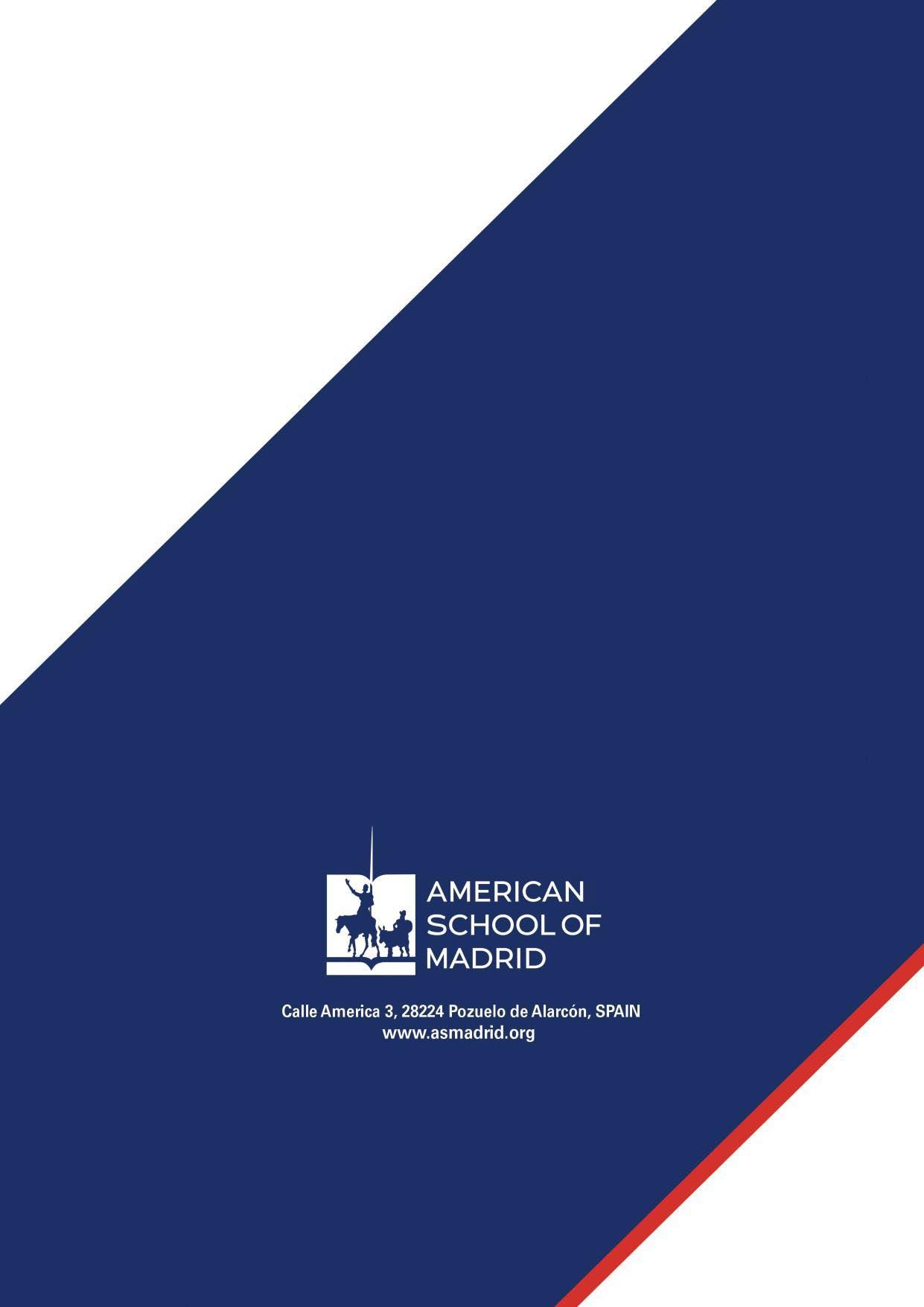

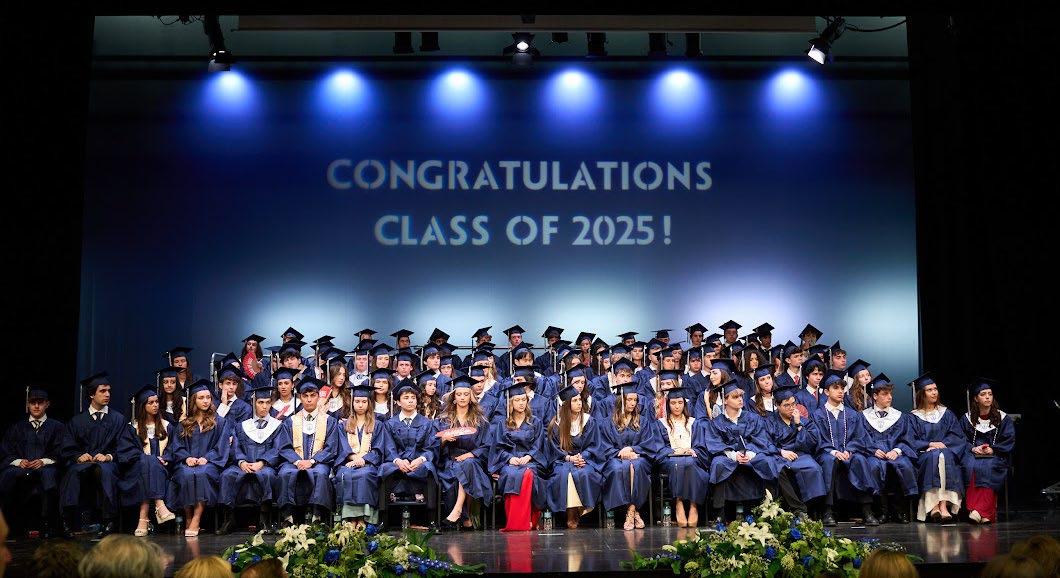
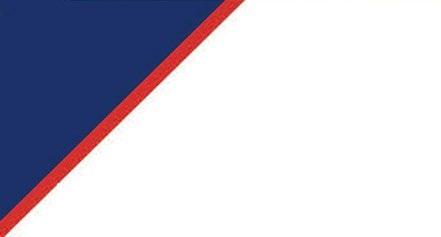





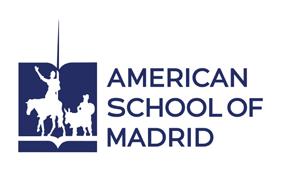



“We empower lifelong learners to take on challenges and thrive, care for others in our diverse international community, and think globally and creatively toward a better future.”
The mission is structured with four keywords - empower, challenge, care, create - we have called cornerstones. The cornerstones focus attention on qualities that, as an American school, we feel are at the heart of all we do.
Our school community and teachers agree that important learning:
• It should be purposeful and relevant.
• Involve real-world experiences, risk, and failure, self-reflection, and choice.
• It is a continuous process.
• Requires pushing through challenges and perceived limits.
• It is facilitated by skillful, caring teachers.
• Requires students to actively own their learning.
• It takes place within a positive, supportive school community.
• It is supported by perseverance, problem-solving, self-reflection, time management, empathy and collaboration.
• Require creativity by teachers and students.


An IB education is holistic in its approach and emphasizes the intellectual, personal, emotional, and social growth of all learners. The curriculum framework is based on concepts, content, and skills and with an emphasis on international mindedness. The learner profile and the approaches to teaching and learning help students to “learn how to learn” and empowers students to develop the skills and dispositions necessary for leading healthy and happy lifestyles with the ability to form strong and healthy relationships.
The International Baccalaureate was founded in 1968 in Geneva Switzerland with the creation of the Diploma Programme. Its original purpose was to provide students with a balanced education, facilitate geographic and cultural mobility and promote international understanding.
The International Baccalaureate Organization (IB) now offers a continuum of education for students aged 3 to 19 through its Primary Years Program (1997), Middle Years Programme (1994), and Career-Related Certificate (2012). As of June 2021, over 7,400 programmes were being offered worldwide, across over 5,500 schools in 159 countries. ASM became an authorized IB World School in 1994 to offer the IB Diploma Programme in grades 11 and 12.
What lies at the heart of all IB programmes is its mission statement:
“The International Baccalaureate aims to develop inquiring, knowledgeable and caring young people who help to create a better and more peaceful world through intercultural understanding and respect.
To this end, the organization works with schools, governments, and international organizations to develop challenging programmes of international education and rigorous assessment.
These programmes encourage students across the world to become active, compassionate and lifelong learners who understand that other people, with their differences, can also be right.”


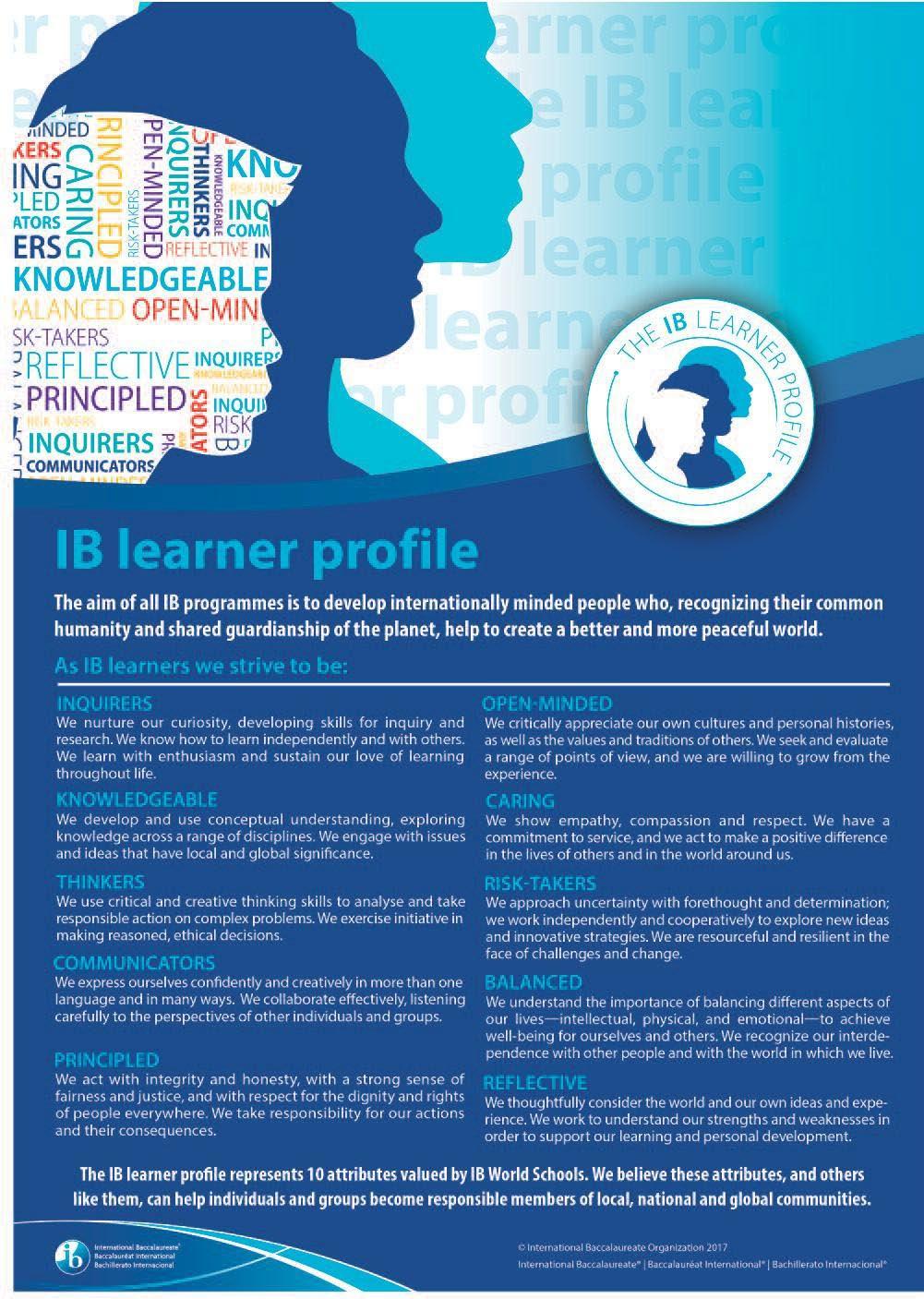


The IB brings to life its mission statement through the IB Learner Profile. This is a set of 10 attributes/dispositions valued by IB World Schools that define the type of learner we want our students to be and that goes beyond academic success.
It is important to point out the overlap between the mission statements of both ASM and IB. Keywords have been highlighted in the IB mission statement to illustrate similar attributes as those in our ASM mission. As an IB World School, ASM must demonstrate a commitment to and support for the IB DP Programme. This extends from teachers, administrators, and the Board of Trustees. Although we don’t offer other IB programmes pre-DP years, we know that our students will be prepared for the IB Diploma years with an ASM education. An ASM education is built on a framework that incorporates similar values, virtues, and end-goals for all our students as those of an IB education. ASM Learning principles are similar in pedagogical approach to the IB Learner Profile and DP Approaches to teaching and learning explained later. An ASM education and the IB Diploma programme are not separate entities. In the Upper School, we have adopted the IB Learner Profile as our ASM Upper School Learner Profile.



The basis of the DP curriculum structure is to provide students with a balanced and holistic education. It aspires to instill ideals in students as well as to provide them with relevant skills for the 21st century. These are articulated through the attributes and descriptors of the IB Learner Profile and the Approaches to Teaching and Learning philosophy. They are incorporated in a rigorous academic programme made up of the study of six subjects and completion of the three Core Requirements. The model is presented visually as follows.
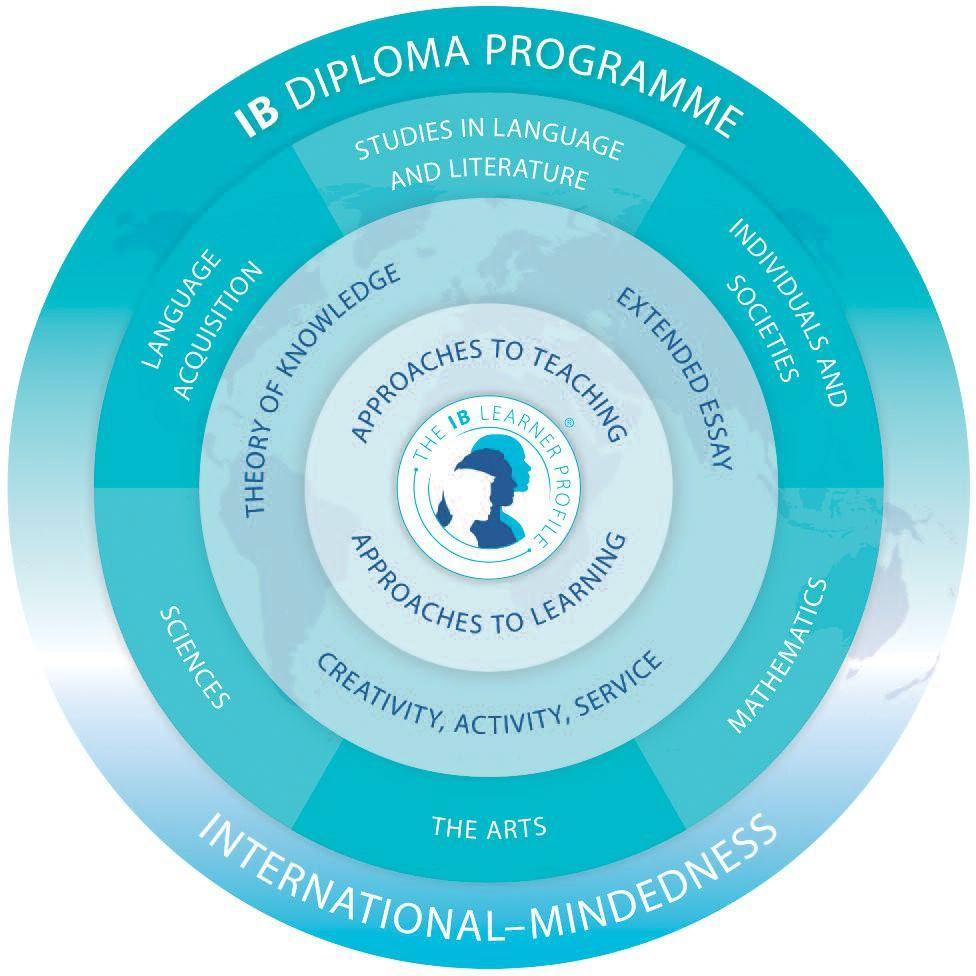


In the Diploma Programme, academic subjects are not taught in isolation, instead, there is a big focus on students developing interdisciplinary connections and understanding the development of what constitutes knowledge in these DP Groups. Learning concurrency is important for the development of connections. Hence the program is set so students obtain a balanced curriculum over two years.
The academic subjects studied are chosen from “Groups” whose names are listed on the outside of the model circle. The six subject groups are:
• Group 1: Studies in language and literature
• Group 2: Language acquisition
• Group 3: Individuals and societies
• Group 4: Sciences
• Group 5: Mathematics
• Group 6: The arts
Students choose one subject from each subject 1-5 and then the 6th subject chosen from group 6, The Arts, or another subject from groups 1 - 5. The subjects offered by ASM in each group can be found on our school website ( www.asmadrid.org) under Academics, Upper School.
Three subjects are chosen at the higher level (HL) and the remainder at the standard level (SL). Standard level courses require 150 hours of instruction. Higher Level courses cover the same material as covered at SL (called Core material which takes up 150 hours) but go into more depth and breadth (additional Higher-Level material) and require 240 hours of instruction in total.
The IB also allows a maximum of 4 HL subjects (2 SL) but leaves it up to a school to decide whether they allow that option. At ASM our policy is that full IB DP students take 3 HLs only. Our reasons for doing so are:
• Student well-being: the program is specifically designed for students to take 3 HL and 3 SL courses, which is highly recommended to be adhered to by the IB. Students taking more than this adds unnecessary workload and time to their schedule, almost always at a cost to their well-being. An additional HL course is an additional 90 hours of contact time in classes.
• IB designed the curriculum so, ideally, students will have significant time out of class to focus on their overall workload. That time starts to disappear significantly when one exceeds 3 HLs.
• Students that want to have additional HL courses in the context of showing colleges that they have taken a highly rigorous program are only showing colleges that they can do more 16-18-year-old work.


• Students are far better off showing that they are learning academically beyond the school curriculum through the endless ways that one can do so. Colleges are aware that students are limited to 3 HLs at ASM and as such understand that students are taking the most rigorous program available to them in that context. Colleges consistently inform ASM that limiting students to 3 HLs is a sound policy and one that they support.
In addition to subject-specific guides, the IB has published “Subject Briefs” which are available on the IB website (ibo.org). These are concise informative overviews of each course’s description and aims, curriculum model overview, and the subject’s assessment model which involves the learning outcomes and course assessment components. The “Subject briefs'' are also posted on our ASM - IB Google Site which can be found by googling the name.



In addition to the six subjects, students must complete the central three DP Core requirements: the Extended Essay (EE), Theory of Knowledge course (TOK), and Creativity, Activity, and Service (CAS).
Though these three core elements are separate components that stand alone, they complement each other and work together to achieve common aims such as:
● support, and be supported by the academic disciplines
● foster International Mindedness: to be responsible global citizens
● develop intercultural and self-awareness
● develop a sense of identity
The Extended Essay (EE) is an independent, self-directed piece of research resulting in a 4000research paper, and students spend 40 hours approximately working at this over the course of a year.
Students are trained in TOK Core class, and each student is assigned a supervisor who work with the students from 3 to 5 hours through the process to guide them to it. Ultimately it is a student authentic work with no help from a tutor, family member, etc. Students will be accessing resources from this link IB Core
Theory of
TOK is a 100-hour course that encourages students to reflect on the nature of knowledge and consider how we know what we claim to know. It invites exploration of the scope, perspectives, methods, tools, and ethics of knowledge.
The TOK course is organized into:
1. Core Theme: Knowledge and the Knower
Encourages students to reflect on themselves as knowers and thinkers Prompts reflection on the communities of knowers they belong to.
Optional Themes (choose 2 of 5): Knowledge and technology; Knowledge and language; Knowledge and politics; Knowledge and religion; Knowledge and indigenous societies
2. Areas of Knowledge (AOKs)
Students study all five AOKs: History, Human sciences, Natural sciences, The Arts, and Mathematics.

1. TOK Exhibition (Internal Assessment - ⅓ of IB TOK grade)

Completed in Year 1 of the DP. This is developed to help students explore how TOK concepts manifest in the real world. Students select three objects connected to one of 35 prescribed TOK prompts.
Sample prompts:
• What counts as knowledge?
• What role do experts play in the production of knowledge?
• What is the relationship between culture and knowledge?
• Does some knowledge belong only to particular communities of knowers?
2. TOK Essay (External Assessment – 2⁄3 of TOK IB grade)
Completed in Year 2 of the DP. Students respond to one of six prescribed essay titles issued by the IB for each exam session.
Sample essay titles:
• How important are the opinions of experts in the search for knowledge? Answer with reference to the arts and one other area of knowledge.
• Is the division of the natural sciences and mathematics into separate areas of knowledge artificial?
• Are there fewer ethical constraints on the pursuit of knowledge in the arts than in the human sciences?
Through TOK, students develop:
• Critical and creative thinking skills
• Research and analytical skills
• Clear communication and argumentation
It also provides students with opportunities to make connections across their IB subjects, deepening their understanding of how knowledge is constructed, interpreted, and applied in different disciplines.

CAS is a component of the DP core.

CAS is organized around the three strands of creativity, activity and service defined as follows.
• Creativity exploring and extending ideas leading to an original or interpretive product or performance
• Activity physical exertion contributing to a healthy lifestyle
• Service collaborative and reciprocal engagement with the community in response to an authentic need
CAS enables students to enhance their personal and interpersonal development. A meaningful CAS program is a journey of discovery of self and others. For many, CAS is profound and life changing. Each individual student has a different starting point and different needs and goals. A CAS program is, therefore, individualized according to student interests, skills, values and background.
CAS - Creativity, activity, service (IB Website: Creativity, activity, service)
Creativity, activity, service (CAS) is one of the three essential elements that every student must complete as part of the Diploma Programme (DP).
Studied throughout the Diploma Programme, CAS involves students in a range of activities alongside their academic studies.
It is not formally assessed. However, students reflect on their CAS experiences as part of the DP, and provide evidence of achieving the seven learning outcomes for CAS.
Educators at IB World Schools can read about the seven learning outcomes in the CAS guide, which is available in the IB store and the Programme Resource Centre (PRC).
How is CAS structured?
The three strands of CAS, which are often interwoven with particular activities, are characterized as follows:
• Creativity – arts, and other experiences that involve creative thinking.
• Activity – physical exertion contributing to a healthy lifestyle, complementing academic work elsewhere in the DP.
• Service – an unpaid and voluntary exchange that has a learning benefit for the student. The rights, dignity and autonomy of all those involved are respected.
In order to demonstrate these concepts, students are required to undertake a CAS project. The project challenges students to: show initiative
demonstrate perseverance develop skills such as collaboration, problem solving and decision making.


The IB uses both externally and internally assessed coursework in addition to written examinations administered internationally, to assess student performance. These written exams are taken in May of the senior year. All internally assessed coursework, and some externally assessed coursework are completed over extended periods of time, by specific deadlines, throughout the programme. Internal assessments are marked by the teacher and student samples are then moderated externally by IB examiners. All coursework is completed under teacher supervision and must be authenticated by the teacher. TOK, EE and CAS do not have written exam components nor do IB Visual art or IB music. The following table lists examples of external and internal assessed work.
essays including TOK and EE
structured problems
short answer response
Case-study questions
Portfolios
individual oral work in languages
Individual investigation in the sciences
individual explorations in mathematics artistic performance/exhibitions
presentations
Upon successful completion of all assessment components for each of the six subjects including the DP Core requirements, students are awarded the IB Diploma from the International Baccalaureate Organization (IB) in Cardiff, Wales.

Grades for each subject are awarded on a 1 to 7 scale, with 7 being the highest. This grade is determined from the results of the internally assessed and externally assessed components in each subject. The IB awards the same number of points for higher level (HL) and standard level (SL) courses, reflecting the IB’s belief in the importance of achievement across a broad range of academic disciplines. HL candidates are expected to demonstrate the various elements of the grade descriptors across a greater body of knowledge, understanding and skills. Diploma Course candidates are also assessed according to the same DP standards and principles for each subject registered.

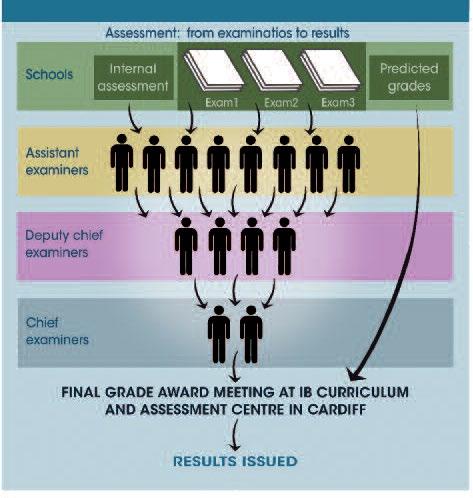
IB DP assessments are criterion- referenced and internationally benchmarked. The following is a brief overview of the quality control process that goes into IB marking.
Exams are scored and moderated multiple times to ensure accuracy and monitor the work of examiners.
Examiners are ‘quality checked’ through a process of moderation. Exams are re-marked if there are unexpected deviations.
Each subject’s composite grade (on a 1-7 scale) is then converted to equivalent points. TOK and EE are graded on an A-E scale. The matrix below is used to convert the combined TOK/EE results into bonus points. CAS does not receive a grade, but specific requirements must be met.
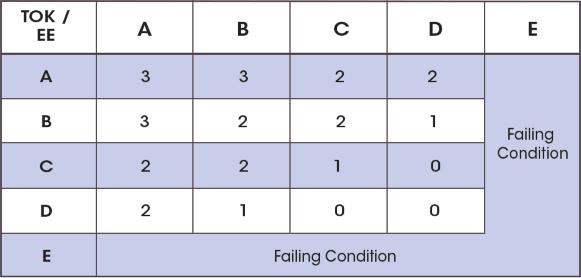

A candidate can only receive an IB Diploma if the following conditions are met:

• The candidate has achieved at least 24 total points: 12 points from HL and 9 from SL subjects.
• A D grade has been awarded in both EE and TOK, and CAS requirements have been met. (See TOK/EE MATRIX for determination of Bonus Points)
• No grade 1 awarded in any subject (SL or HL).
• There are no more than two grade 2s awarded (SL or HL).
• A Bilingual Diploma will be awarded if a student completes and receives a grade 3 or higher in two languages selected from DP group 1 studies in language and literature.
• There has been no penalty received for academic misconduct from the Final Award Committee
The maximum number of points that can be earned is 45. This comes from a maximum of 7 points from each of the six subjects, and 3 bonus points from the combined scores of the Extended Essay and Theory of Knowledge. CAS requirements must be met. Less than 1% of students worldwide obtain a score of 45 points.
If the conditions for the award of the Diploma are not met, candidates will still receive DP individual course results. A maximum of three examination sessions is allowed in which to satisfy the requirements for award of the IB Diploma.


Students at International Baccalaureate (IB) World Schools are given a unique, challenging and diverse education.
IB learners:
• are encouraged to think critically and solve complex problems
• drive their own learning
• are culturally aware, through the development of a second language
• can engage with people in an increasingly globalized, rapidly changing world
• earn a qualification that is accepted by universities worldwide
The IB works with the higher education community to ensure IB students get the recognition they have earned and further develop their programmes to make sure they continue to offer the best preparation for university studies and life beyond. Higher education institutions around the world admit students based on their IB credentials, and many have specific admissions policies and guidelines for IB students. Admissions criteria can vary widely across educational systems and the selectivity of the institution. For students, success in the IB often results in advanced standing, course credit, scholarships, and other admissions-related benefits at many universities. On the IB website, there is a page dedicated to country recognition statements.
Universities and colleges benefit from recruiting and admitting IB students for many reasons due to the knowledge, skills, and disposition students have developed in their DP years which are needed to be successful throughout their university careers both academically and through contributing to various aspects of university life. Independent research carried out by universities also provides evidence of increased college acceptance and retention rates by students who have studied the IB Diploma Programme (diploma or courses), timely graduation rates as well as college readiness.




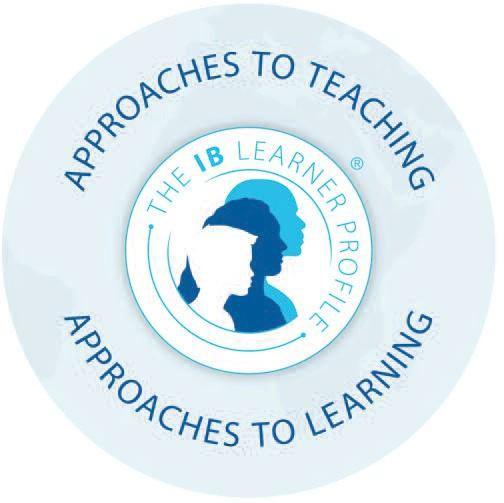

At the center of the Diploma Programme model circle is the IB learner. Surrounding the IB learner is the Learner Profile and then the Approaches to Learning (ATL) and the Approaches to Teaching (ATT).
The Approaches to Learning (ATL) are a set of skills or strategies designed to enable students to “Learn how to learn”. These skills are implicit and explicitly taught and are incorporated into a lot of the different types of coursework students complete for the Diploma Programme.

1. Thinking skills
2. Communication skills
3. Social Skills
4. Self-Management Skills
5. Research Skills

Some Examples of these skills (taken from DP from Principles to Practice and ASM US ATLs descriptors which are shared with students)
Critical thinking, Creative thinking, Transfer skills, Metacognitive skills, Ethical Thinking
Listening, Speaking, Reading, Writing, Nonverbal communication, Presenting
Collaboration, adopting a variety of Group roles, Accepting Responsibility for actions and guided by principles of equity and fairness
Organization, Affective Skills (can recognize current social and emotional state to maintain focus). Resilience and Reflection skills
Information Literacy, Media Literacy and monitoring Media Consumption. Ethical use of media/information, comparing contrasting validating and prioritizing data.
Approaches to Teaching (ATT) are six key pedagogical principles designed to support teachers to help students “learn how to learn”. They are:
1. Based on inquiry.
2. Focused on conceptual learning.
3. Developed in local and global contexts.
4. Focused on effective teamwork and collaboration.
5. Differentiated to meet the needs of all learners.
6. Informed by assessment.


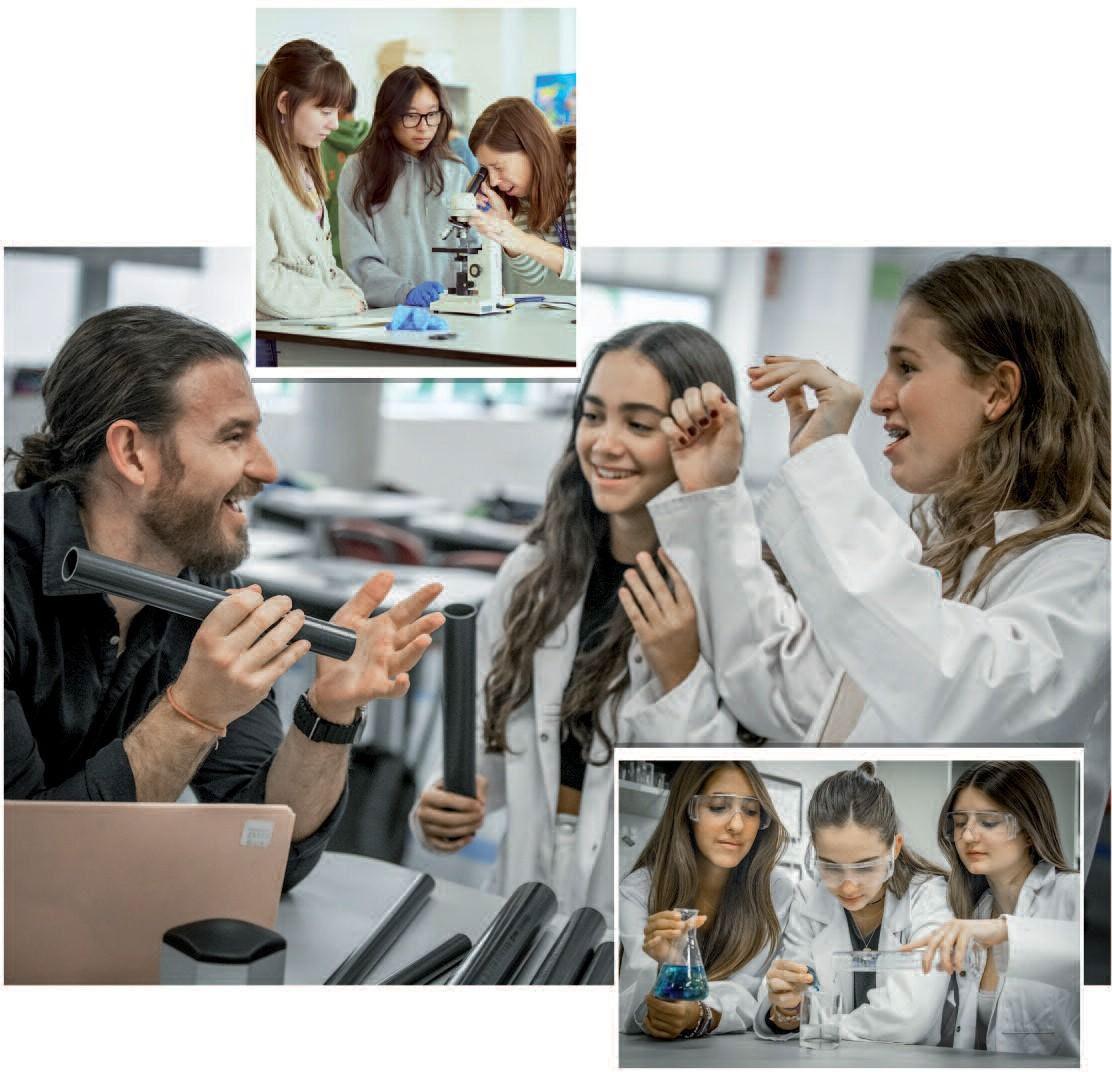


Students at the American School of Madrid are encouraged to participate in the IB Diploma Programme. Those who successfully complete the programme will earn two qualifications: the ASM US high school diploma and the IB Diploma. Candidates in the Diploma Programme study three subjects at the Higher Level (HL) and three at the Standard Level (SL), in addition to completing the Core components: the Extended Essay (EE), Theory of Knowledge (TOK), and Creativity, Activity, and Service (CAS).
Students also have the option to take individual IB Diploma courses alongside ASM courses to fulfill graduation requirements. Diploma Course candidates are exempt from completing the EE, TOK, and CAS, and they can choose the number of subjects they wish to take for exams at either the higher or standard level. Typically, Diploma Course candidates receive individual Diploma Programme Course Results (DPCR), previously known as certificates.
Making the right choice between the Diploma Programme and individual Diploma courses involves important discussions and counseling beginning in grade 10 and continuing through grade 11. This process includes conversations among the student, parents or legal guardians, relevant teachers, Upper School college and guidance counselors, and the IB DP coordinator.
Regardless of the pathway selected, due to the nature of our course offerings, students will take at least two or more DP courses as part of the ASM curriculum requirements. Therefore, each student will benefit from an IB education.
Beginning in September of grade 11 (the first year of the programme), ASM students will attend workshops during their TOK/Core class time. These workshops will cover the expectations and requirements of the Diploma Programme, what is necessary for success, and key IB policies, in particular to understand and follow the academic integrity one.


Learning skills are essential life skills that can significantly impact a student's daily life. It's important to remember that we are all part of a team - students, teachers, administrators, and parents - and we need to work together to support you during these crucial two years of your life. The Approaches to Learning (ATLs) give us a shared language that can enhance our collaboration and guide us on our learning journey.
The development of thinking skills, including critical thinking, creative thinking, and transfer skills, can significantly enhance your decision-making in life. Learning techniques such as brainstorming and creating visual aids like concept maps can help you evaluate the problems you may face and generate potential solutions. By honing your thinking skills and practicing reflection, you can better recognize issues and gain different perspectives, which will enable you to make wellinformed decisions.
Our students are taught to be effective communicators, which is also an attribute of the IB Learner Profile, across various subject disciplines. They learn to read and interpret different texts, write in various contexts for multiple purposes, and formulate arguments both verbally and in writing, all while using more than one language.
Developing these communication skills is crucial for building positive interpersonal relationships with peers, teachers, administrators, and parents or guardians. As stated in our Upper School Handbook, each student should have at least one adult on campus with whom they feel comfortable discussing school-related issues, friendships, or personal challenges. This includes having the courage to report situations such as bullying or sexual harassment. Students should never feel afraid or ashamed to ask for help or seek advice.
The teacher-student relationships are essential for creating a healthy learning environment. It is important to inform your teacher in advance if you anticipate missing a deadline, as this helps maintain trust in the relationship. If you find the material challenging, reaching out to your teacher early on is much more beneficial than waiting until just before a summative assessment or an IB deadline to ask for help. Ultimately, you are responsible for your own learning, but there are adults available to support you.
Be proactive by keeping an open line of communication with those around you. Engage respectfully with your teachers, peers, and parents or legal guardians. Be receptive to their guidance and constructive feedback. At the same time, don't hesitate to provide respectful feedback and advocate for your own needs.
Social skills are important to be able to function effectively in the school environment. They help you to develop healthy relationships with your peers, teachers, administration, and parents/legal guardians. These skills, as with communication skills, may help you resolve any conflicts that arise within school either academically or socially, in or outside of school. Developing empathy also helps you to be open to other people’s perspectives.


Self-management skills will help you develop your organizational skills and keep on track of deadlines. These skills can help you to plan what you need to do well in advance and pace out your work in chunks, which will reduce stress in the long run. There will be stressful times but when you are in this situation it is good to reflect on what is causing the stress and to communicate with people around you to ask for help.
Self-management also means developing affective skills. These can help you to manage your state of mind and stress management. They can help you recognize that maybe it’s time to build up exercise, do something creative or provide service to others, as well as getting enough sleep and eating healthily
Building time into your work schedule for yourself, your family, relaxation, and mindfulness is important. A certain amount of stress and self-awareness helps build perseverance, emotional management, and resilience. Self-management skills will also help you manage your time efficiently at school by using your study periods and multipurpose time wisely.
Research skills are not only relevant for your day-to-day assessments and coursework. You will also be thinking about colleges in grades 11 and 12, or thinking about a Gap Year. Using skills developed through completing school-related research will make you more efficient in finding out what you need to know for the courses you are interested in studying in the future.
The use of technology will help you find out and understand what colleges require for the application process and can also provide you with information about other course options that are out there that you did not know existed. There are plenty of resources available for you to access. It is important to form a good working relationship with your college counsellor and to keep her/him up to date with your plans. Be open to listening to her/his professional advice.


Each subject must complete research-based coursework which is submitted to the IB at different times over the course of the two years. They contribute to your overall grade in a subject. The research-based work addresses specific criteria in a subject and is graded against a subject rubric. Examples of the types of coursework Internal Assessment (IA) in each subject and additionally External Assessment in some subjects (EA) are provided in the Examinations to Results section. All coursework must be completed and submitted to the IB. Failure to submit this work will have the consequence of you not earning any credit for this subject. This will cause you to forfeit your IB diploma.
However, you can receive individual course certificates for your other subjects.
Part of the job of the DP coordinator is to create a calendar of these DP coursework deadlines and to ensure that the deadlines for each subject are spread out as much as possible over the two years. This is to help you as the student manage your time and as well leave you with time for study/revision before the DP exams. It is important to respect the deadlines set on the calendar. They are non-negotiable. If you foresee problems well in advance, please reach out to your teacher or the DP coordinator so that we can help you resolve issues and prioritize your work. Also, be mindful that your teachers have busy schedules too and work and must plan their time to teach, and grade work for their other grade-level classes. Respecting these deadlines will also ensure that teachers will have the required time to provide you with sufficient feedback, verbal or written, (as specified by the IB) as you work through the different stages of your coursework component. Not taking these deadlines seriously could provide the impression that you are not respecting your teachers’ time and the learning time of other students.
When your coursework is completed, your subject teachers have to sign off on the authenticity of your work before it can be submitted by the DP coordinator tothe IB. This means that your teachers must know your work through planned outlines, mini-deadlines, or discussions in class about your work, and submission of a complete draft on time. Your teachers and the DP Coordinator must be confident that you have not breached any academic rules such as collusion or plagiarism. The ideas you present have to be your own. If you use ideas from elsewhere, they must be cited properly by using in-text citations and a bibliography provided, at all stages of your work. All IB coursework must be uploaded on Managebac, a platform you will be coming familiar with, which is also linked to Turnitin.com.
You as an ASM and IB learner are responsible for keeping a backup of all your work. Please do not store all your work on your computer desktop as hard drives can get damaged or computers stolen or lost. Keep your work organized in properly named folders on Google Drive and save all files with a consistent file naming format. We will use a standard naming format for IB coursework files.


All written IB coursework must be completed on a Google Doc shared with you by your teacher. This will enable us to track the timestamp of when you complete your work. All IB work must be carried out under the supervision of your teacher. A tutor cannot help you complete it or any other person. AI-generated content can't be used, as it will not be your work. All sources should be cited in text, and a bibliography provided.
The work must be your own authentic work.
The complete draft of work submitted to your teacher for important feedback must be complete in all aspects. Teachers can only provide feedback on one complete draft. Therefore, incomplete sections cannot be amended after submitting the complete draft. Also, topics must remain the same after this submission. Please use the time allocated in class to work on your coursework and follow the check-in dates. If you get behind, it will impact your work in other subjects.
Work must be submitted to Managebac (linked to Turnitin) by the published deadlines for the complete draft and final version.
All files must be submitted in PDF format with the file name in this format:
Work title, subject, the version, first initial, and the first two letters of your surname, E.g., IAphysicscompleteMBr or HLengessayfinalMB. This way, you will develop a consistent way of naming files and avoid submitting incorrect ones.
If the final Deadline is missed, your complete draft is submitted to the IB.


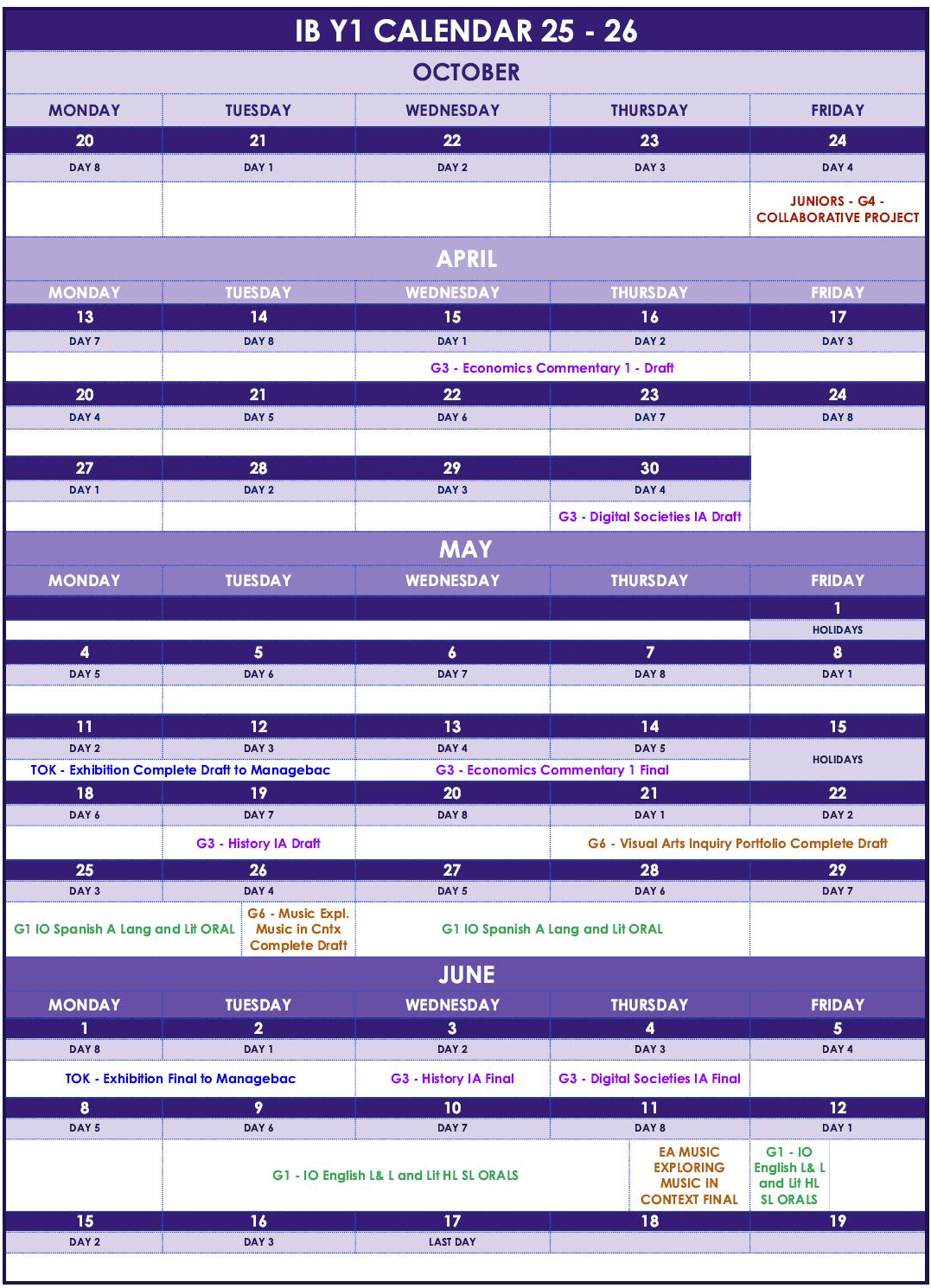


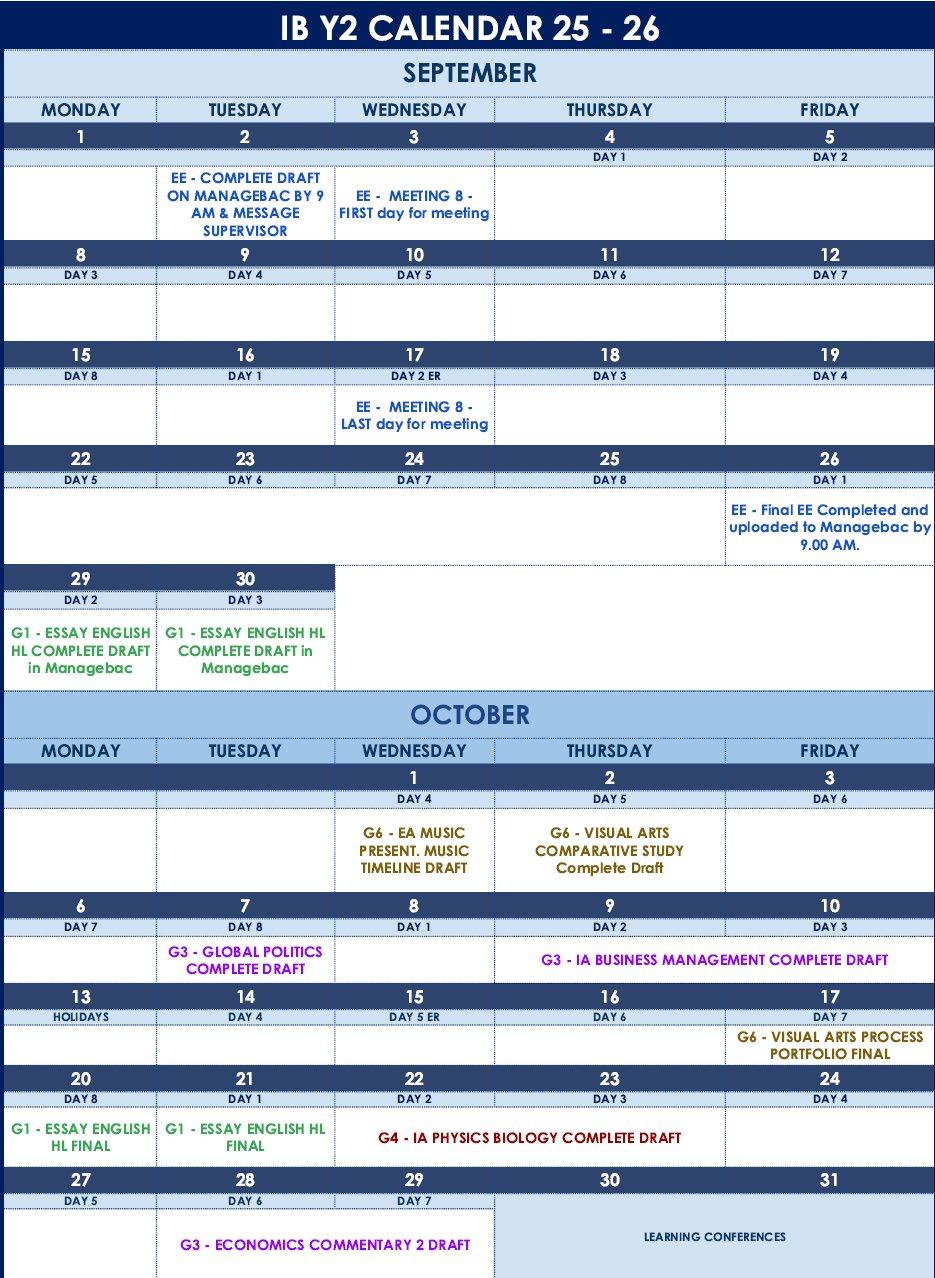


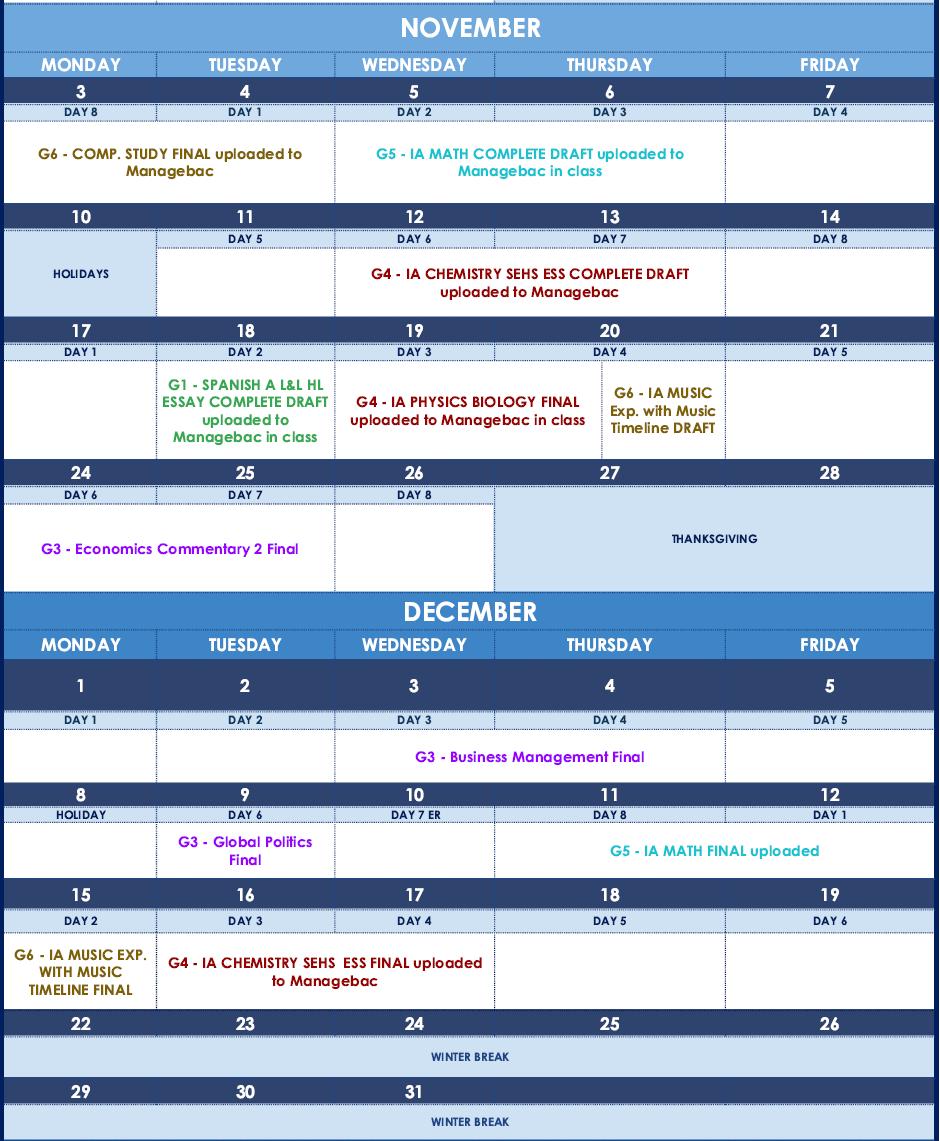


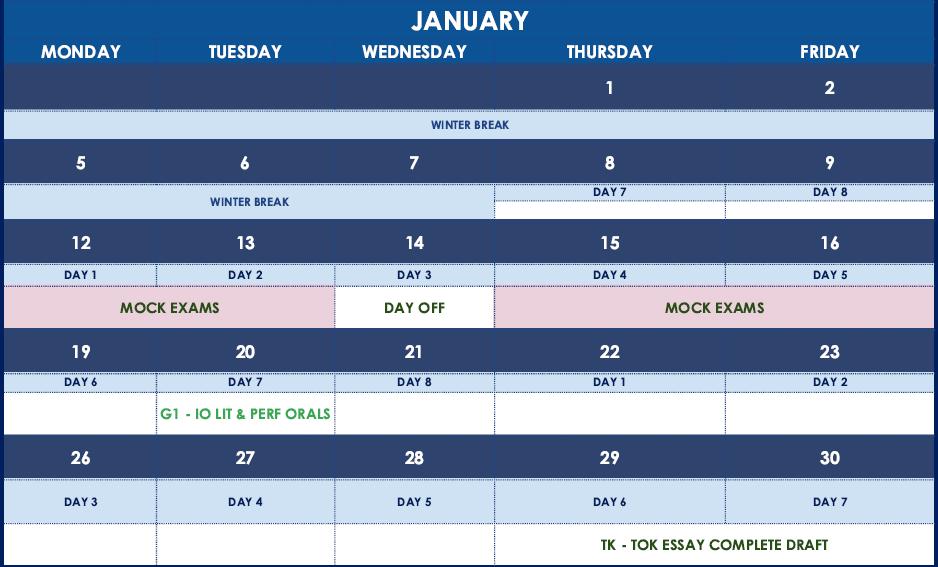






The IB written Exams occur in May of the second year of the programme. In preparation for these, students sit "Mock Exams" (see dates on the deadline calendar). These Mock Exams are designed to replicate IB exam conditions as closely as possible. Their purpose is to help the student become familiar with the exam process, develop effective exam-taking strategies, and understand what to expect during the real exams.
This preparation can significantly reduce anxiety. Participating in mock exams provides valuable experience, different to regular “in class” exams. A student will get a sense of what it feels like to be in an exam hall for a set period and how to manage the transition between two different subject exams on the same day.
This experience can also highlight for a student how mistakes can occur under stress, such as misreading instructions or using time inefficiently. It's essential to note students have only one opportunity to take the IB exams, with no retakes allowed except in November.
Feedback from teachers on the marked exams can be very beneficial. Students should reflect on their performance and identify which skills need further development or which content and concepts require additional work.
The IB Diploma Programme (IB DP) is a two-year commitment, and maintaining consistency in studies and incorporating regular review sessions will beneficial in the long run. Mock Exams are one way to encourage this approach.
Please note that Mock Exams are not high stakes in terms of grading and are not intended to create additional stress for students. Their goal is to help prepare for the actual exams. The grades from these mock exams will not solely determine your predicted grade for college. Instead, those grades, along with your performance on the ASM transcript at the end of grades 11 and 12, will be based on a comprehensive evaluation of your work in each subject over a designated time period.

These are the expectations when taking any sort of assessment at ASM.

• Student bags should be placed in a designated area in the classroom, away from the desks.
• Mobile phones and smart watches must be handed in to the teacher before the test begins. Failure to do so will be considered a breach of testing conditions, regardless of whether the phone is used. Teachers must announce this at the start of the exam at a time when they have the attention of all students.
• Students should have only the necessary writing materials on their desks no pencil cases or additional items should be present.
• Water bottles should be placed on the ground, not on the desk.
• Students may use the restroom only before the exam starts or after they have completed their exam. They should be informed of this in advance of taking the exam.
• If a graphic calculator is needed, it must be in test mode and cleared up before and after the test. Otherwise, a class set of four function calculators is required.
• Students should not wear headphones (unless there is a specific accommodation for a student).
• Smart watches are not to be worn.
• Students should not ask clarifying questions during an exam, unless there is an issue with the exam itself that needs clarification and correction. If this occurs, students taking the exam in Learning Support should be informed of the clarification/correction.
• Teachers should occasionally walk around the room or sit behind the students while they are taking the test.
When there are a breach of academic integrity or the expectations outlined above:
• The student is informed by the teacher of the potential breach of academic integrity/assessment regulations.
• The teacher notes the time of the breach on the front of the student’s assessment paper.
• The student may or may not be allowed to complete the assessment, depending on the specific situation.
• At the end of the class, the teacher reports the incident to the Upper School Assistant Principal.





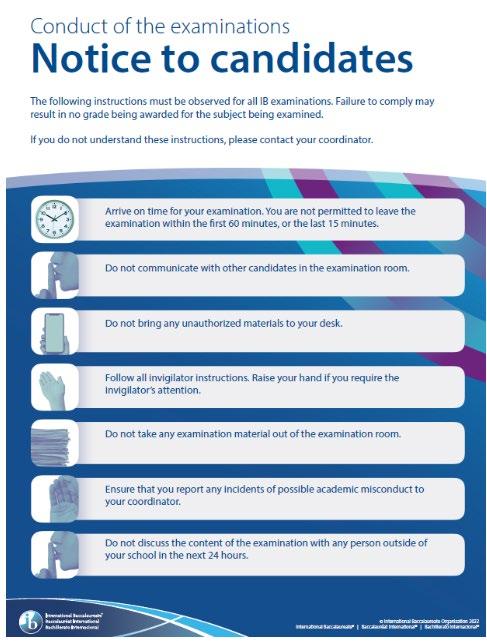


During September of senior year, we start the exam registration process for the following May’s (2026) International Baccalaureate Examinations.
• Candidates must fill out the required information for DP exam registration on Managebac. Details on how to do this will be shared with students. The information required includes e.g. the student’s name, subjects, and level, date of birth, nationality, and first and second language.
• Subject fees are paid by families. There is a fee for each assessed subject taken by an individual candidate. There is no subject fee for either Theory of Knowledge or the Extended Essay when taken as part of the Diploma Programme.
• Once the student fills out the required information a copy of this form and bill for fees will be emailed to each family by the IB office. Payment is made by bank transfer to the ASM Bank Account. Once proof of payment has been received by the ASM Business office we will register the student.
• Each candidate is responsible for payment of IB exam fees required Late penalty fees may result from inaccurate information or missed deadlines. These late fees are determined by IB.
• If a candidate’s registration category is changed after the registration deadline the appropriate registration amendment fee will apply. This includes a change from a Diploma Programme candidate to a Diploma Course candidate.
• The subject fees are not refundable if candidates withdraw from a subject or the entire examination session after the late registration date. Exam Fees are published on the IB website. These are the fees for 2026:
Subject fee (per subject per candidate) 92 euros (DP Candidates take 6 subjects and there is no charge for core fees for Diploma Programme candidates).
Core fees (per candidate) EE: 70 euros TOK: 36 euros CAS: 7 euros
These fees are for each core requirement a DP course candidate is registered for and for Diploma (D) candidates retaking a core requirement.
Late Fees will be applied for the addition of a subject and for each amendment to a subject, level, or response language, including TOK or an EE, after the registration deadline. During the late registration period November 15 to Jan 15 - 29 Euros (add to above subject fee) After the registration period from January 15 – 113 Euros (add to above subject fee)
Withdrawal from exams: The student won’t be refunded if the withdrawal is after the late registration fee. In any situation, the late registration fees are not refundable.





In the first few days of school students and parents / guardians will be receiving a Google form to complete, according to your IB DP Year (Y1 or Y2, i.e. Grade 11 or Grade 12) acknowledging the understanding of the Rules and Regulations of the DP Programme. Below is an example of the forms. They consist of an Agreement Form with ASM and a Form of acknowledging receipt of IB General Regulations from the IB. Students and parents sign by typing their name and their email address (which is also automatically saved) in the Google Form.
All the students from Grade 11 and their parents/guardians must fill this form Form to Grade 11 Students and Parents which includes the following:
I understand that choosing to be a Diploma candidate is a two-year commitment that requires rigorous preparation and work outside of class time. It also involves the completion of IB coursework over the 2 years in addition to sitting written exams in May of the senior year.
To complete the IB Diploma Programme, I agree to each of the following policies and deadlines by signing below:
I will take 6 IB courses over two years, three at the Standard level (SL) and three at the Higher level (HL).
Besides six subjects, I must complete the CORE requirements: Theory of Knowledge (TOK), Creativity, Activity, and Service (CAS), and the Extended Essay (EE).
I will commit to 18 months of CAS (Creativity, Activity, and Service) by the ASM corresponding deadline. I will regularly meet with the CAS coordinator for the three required meetings and plan and update my CAS portfolio on Managebac, and complete all the reflections.
I understand that choosing to be a IB Course candidate is a two-year commitment that requires rigorous preparation and work outside of class time. It also involves the completion of IB coursework over the 2 years in addition to sitting written exams in May of the senior year.


1. I will complete all required IB assessments by the deadlines set by the IB Coordinator. The calendar is on the ASM IB Google Site If I am a Full Diploma Candidate, this includes completing the CORE requirements: Theory of Knowledge (TOK), Creativity, Activity, and Service (CAS), and the Extended Essay (EE) by the deadlines set.
2. Failing to meet IB deadlines may result in some of my work not being submitted to the IB, and hence, I am not eligible to complete exams in that subject in May.
3. All work must be my authentic work. Tutors or anyone else cannot be used to write my IB coursework. I must work with my teacher, as the teacher has to be able to verify the authenticity of your work. All work must be completed on the Google Doc template shared with me through Google Classroom by my teachers. This is to avoid any issues with the authenticity of my work as time stamps can be checked.
4. When a complete draft of IB coursework is due, it means it is a full draft, NOT A ROUGH DRAFT. There can be no sections missing, as the teacher can only give feedback once on this draft. Also, I agree to meet the check-in points set by the teacher, so I don't fall behind on my work.
5. I understand that plagiarism: (the representation of the ideas or work of another person, AI generated work, without proper citation, as my original work), collusion (allowing one’s work to be copied or submitted for assessment by another), duplication of work (presentation of the same work for different assessment components) in any aspect of my IB internal or external assessments or falsifying a CAS record will forfeit my being to sit for exams in those subject areas ,hence forfeiting the Full Diploma If I am a candidate.
6. Exclusive copyright of Student IB work: All students’ IB coursework must be uploaded to Managebac under the calendar links provided by ASM, as it is submitted through Turnitin before submission to the IB for grading. Work should not be submitted through other institutes Turnitin databases as the work becomes the intellectual property of that institute. If a student wishes to keep exclusive copyright of their work, please inform the IB DP Coordinator to prepare paperwork before May 1st of the year of the Examination session. Without this request filed, the student’s work automatically becomes the property of the IB.
Dear Parents or guardians of an ASM IB Diploma Programme candidate:
As of September 2006, it is the responsibility of IB World Schools to supply you with a copy of IB General Regulations document in English or Reglamento general del IB en español and that you acknowledge receipt of these documents. These documents set out the expectations that IB schools and their students must comply with in respect to assessment and delivery of IB exams.
Having received a copy of the IB General Regulations I acknowledge receipt of this document and understand the rules, in particular the copyright relating to students’ materials submitted to the IB as provided under Article 3 of the General Regulation
Note: Students will receive a shortened version of this form in senior year to remind them of their commitments.





The ASM IB Website is the internal website where the students will find all the information and documentation needed over the two years programme.
Among this information we highlight:
- IB Deadlines Y1 and Y2 where the student can find the deadlines in a google calendar, and also in PDF format
- ASM IB DP Policies which includes the Admissions, Inclusion, Language, Academic Integrity, Assessment, and Complaint Handling and Appeals policies.
- ASM Upper School Rotation and Block schedule.
Note: due to protection data regulations, there are sections that are shared only with students.


US Director Felim Bolster felimbolster@asmadrid.es
US Assistant Principal Rehema Allen rehemaallen@asmadrid.es
US Administrative Assistant Karolina Proszynska karolinaproszynska@asmadrid.es
US Guidance Assistant Blanca Martin blancamartin@asmadrid.es
College Counselor
College Counselor
John Mc Cracking johnmccracking@asmadrd.es
Dijiara (DJ) Meehan djiarameehan@asmadrid.es
Learning Support Collin Swanson collinswanson@asmadrid.es
Learning Support Jacki Brick jacquelinebrick@asmadrid.es
Librarian Liz Keating lizkeating@asmadrid.es
CAS Coordinator Andy George andygeorge@asmadrid.es
IB DP Assistant Sandra Perez sandraperez@asmadrid.es
IB DP Coordinator Dr. Martina Bree martinabree@asmadrid.es
